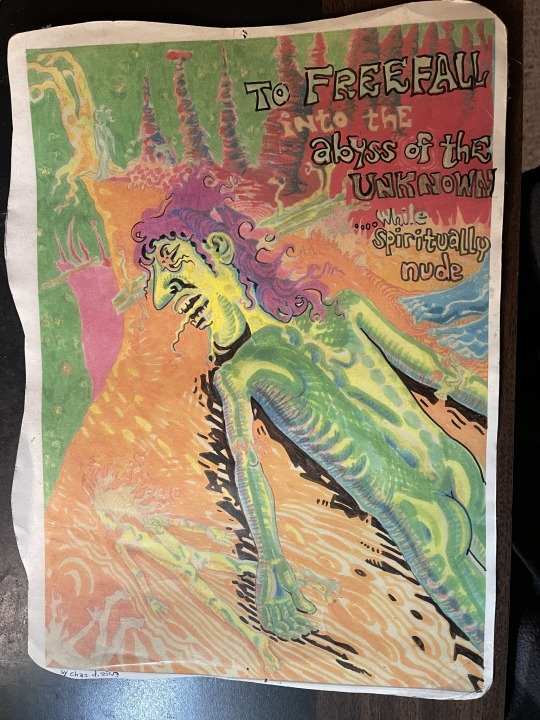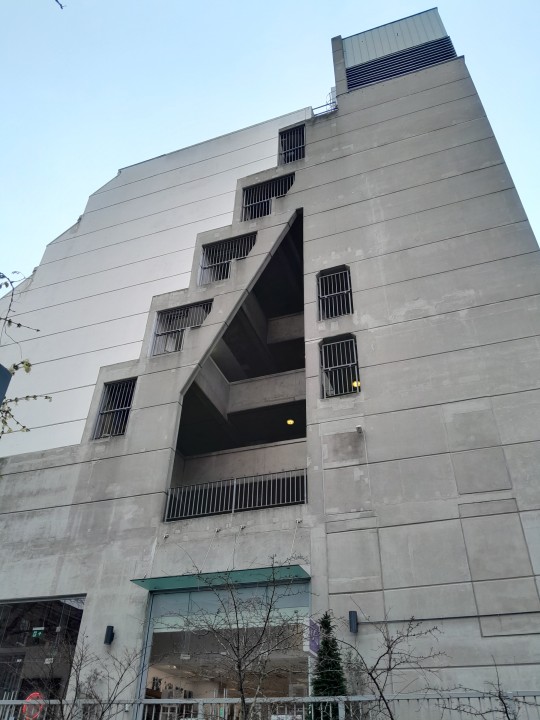#pilgramage
Photo

Deity: Bahamut the Martyred Wyrm
He does not answer our prayers, we answer his, the dying plea of a selfless creature who wished only that someone would stand up and care for his people after he had given his last for them.
We Stand for Bahamut,
Would you Stand With us?
The Dragon is dead, but he is remembered. One of the earliest heroes in mortal history, ever bright Bahamut turned against the proscribed order of the world and his very being to fight on behalf of the innocent; Sacrificing himself when it became clear that he had no other means of unseating the tyrant that ruled over them. His actions resound into the present day, somewhere between a folk hero and a saint for many cultures where his story and example have taken on a power all their own, called upon by the fearful and the righteous in their greatest times of need.
There is no one church of the platinum dragon as such, but there are organizations that claim him as their inspiration. Often these temples will feature some local hero or great exemplar that they claim best exemplified Bahamut’s virtues, though these “aspects of the dragon” vary extremely in their actions, ethos, and representative philosophies.
Since he embodies reckless benevolence, courage in the face of adversity, a willingness to overturn established orders, Bahamut is often seen as the patron of more noble adventuring types, who may too often chafe under the responsibility and goody-two-shoes reputation the mythic dragon has garnered over the intervening centuries.
Hooks:
If you want to prove yourself daring and brave they say, go up to the shrine of the platinum dragon in the mountains. Make offering and meditate by the altar fires, and by dawn you will know if Bahamut has deemed you worthy or not. It’s only a few hours into the party’s vigil when the party hear distressed cries and the sounds of the skirmish resonating off the walls of the ravine, likely coming from the river at its mouth. Do they head out into the darkness and abandon their rite, or do they stay put and do as they’ve been told? Given that they’re at the shrine of a god of righteous bravery, the question should not be that hard to come by.
The party receive a glimpse into their possible future as they watch a pair of higher level adventurers brawling on the steps of one of Bahamut’s temples, interrupting the service for their own fallen companion. Once a close knit group of friends, this adventuring party has been sundered by the death of their paladin, a devout of the platinum dragon who gave his life so that the others could escape from a rampaging monster. One of the adventurers, mourning the loss of her best friend screams that the paladin’s sacrifice was stupid, while another won’t hear ill of the dead on the day they’re set to bury him. Some time later, one of the presiding priests will ask the party’s help in reconciling the grieving pair
Descended from a celebrated champion of Bahamut famed for battling a dragon on his own, a noble house has become increasingly arrogant and ambitious, seeing themselves as favored by the dragon god and claiming their ancestor’s virtues as their own. Their hunting of drakes and other minor wyrms has esiclated over time, and now the scion of their house wishes to mount an expedition and hunt a true dragon lairing in the nearby wilderness and he wants the party to help. Whether or not the heroes decide to tag along, the scion manages to give the dragon a nearly mortal wound, only for its mate to show up a few hours later and begin razing the countryside in a fairly justified rage. The party are then faced with a choice of either killing both dragons or playing against type figuring out a way to heal the first of the pair and quell their mates anger.
The tale of Bahamut is one of the oldest, most cherished myths among mortal kind, shared between all folk who believe that good can be done in the face of impossible odds. The legend speaks of a ruthless archon, a domineering celestial that ruled from atop a mountain sized palace, quarried and built for it by the first mortals, whom it had enslaved generation after generation and forced wait upon it and its insatiable greed and hunger. Bahamut was that archon’s mount, a part of its divine essence sectioned off and given wings, tasked with flying about the archon’s realm looking for any trace of indolence or rebellion. It was in these flights about the realm that Bahamut saw the people’s suffering, and came to understand that he and the archon’s heavenly appointed mission to govern the mortals was incomparable with the tyranny he and his rider had afflicted upon them.
There are many stories of the dragon’s small rebellions, but they all cultivate in a final confrontation between mount and rider, when Bahamut could take no more of his master’s abuses and bore his fangs against it. The two clashed in the palace, on the mountainside, and then in the sky, but neither could best the other, being two halves of the same whole. On the sixth day of their battle, exhausted and desperate and knowing what must be done, Bahamut plunged at the archon, allowing his master to skewer him through with its sword in order to get his teeth into the celestial’s neck, and gripping on with all his might he bore the archon down from the sky and struck the earth like a silvery star.
When the mortals found them in the smoking crater, the archon was dead and the dragon was soon to follow. With what little strength he had left, with his broken teeth still clutched around his master’s neck, Bahamut uttered one final plea: “ It’s up to you now, look after one another, I’m sorry I could not do more”
From the Author: I felt the need to revamp Bahamut because as one of the default “good” gods he felt far too conceptually thin, with everything about him pretty much revolving around being generically benevolent while also being a dragon. With this revamp I specifically wanted to address the nature of heroism, and how heroism as a cultural virtue might be viewed in a setting where adventuring parties are the norm.
#deity#divinity#divinity: heroism#divinity: dragons#divinity: sacrifice#dare#pilgramage#temple#archon#celestial#dragon#diplomacy#Cleric#monster hunt#dnd#dungeons and dragons#d&d#5e
622 notes
·
View notes
Text

Behbeh
#raccoon#fan#artist#graffiti#banksy#go4tart#nyc#sidewalk#love#pilgramage#tag#cartoon#teddy bear#illustration#spray paint#dailybehbeh#behbeh#cute#stuffed animal#trending#art#funny#polar bear
15 notes
·
View notes
Text
Jon bernthal character in Pilgrimage bites out a dudes throat
Just like
Rick grimes does in the walking dead
I love it
8 notes
·
View notes
Text
A History Of Hajj

A history of Hajj - Hajj is one of the 5 pillars of Islam, a duty upon all Muslims and a tremendous blessing from Allah. We all must try our very best to make Hajj, if we are able. Many who undertake the journey spend weeks or months preparing for it. Studying the different rites, obligations and sunnah that make up the entirety of Hajj. But, in a more practical sense, what do we know of Hajj and it's history? Was Hajj only instituted after the advent of Islam? Apparently not, as Hajj has been a part of Makkah and it's people for quite a long time.
Related: Hajj and Tawheed
Hajj literally means ‘to set out for a place‘. Islamically however it refers to the annual pilgrimage that Muslims make to Makkah with the intention of performing certain religious rites in accordance with the method prescribed by the Prophet Muhammad (Sallallaahu ‘alaihi wa Sallam).
Hajj and its rites were first ordained by Allah in the time of the Prophet lbraaheem and he was the one who was entrusted by Allah to build the Ka’ba – the House of Allah – along with his son Ismaa’eel at Makkah. Allah described the Ka’ba and its building as follows:
“And remember when We showed Ibraaheem the site of the House : Associate not anything with Me and purify My House for those who circumnavigate it and those who stand up for prayer and those who bow down and make prostration .”
After building the Ka’ba, Ibraaheem (alayhis-salaam) would come to Makkah to perform Hajj every year, and after his death, this practice was continued by his son. However, gradually with the passage of time, both the form and the goal of the Hajj rites were changed. As idolatry spread throughout Arabia, the Ka’ba lost its purity and idols were placed inside it. Its walls became covered with poems and paintings, including one of Jesus and his mother Maryam and eventually over 360 idols came to be placed around the Ka’ba.
During the Hajj period itself, the atmosphere around the sacred precincts of the Ka’ba was like a circus.
- Men and women would go round the Ka’ba naked, arguing that they should present themselves before Allah in the same condition they were born.
- Their prayer became devoid of all sincere remembrance of Allah and was instead reduced to a series of hand clapping, whistling and the blowing of horns.
- Even the talbeeyah was distorted by them with the following additions: ‘No one is Your partner except one who is permitted by you. You are his Master and the Master of what he possesses’.
Sacrifices were also made in the name of God. However, the blood of the sacrificed animals was poured onto the walls of the Ka’ba and the flesh was hung from pillars around the Ka’ba, in the belief that Allah demanded the flesh and blood of these animals.
Singing, drinking, adultery and other acts of immorality was rife amongst the pilgrims and the poetry competitions, which were held, were a major part of the whole Hajj event. In these competitions, poets would praise the bravery and splendor of their own tribesmen and tell exaggerated tales of the cowardice and miserliness of other tribes. Competitions in generosity were also staged where the chief of each tribe would set up huge cauldrons and feed the pilgrims, only so that they could become well-known for their extreme generosity.
Thus the people had totally abandoned the teachings of their forefather and leader Ibraaheem (alayhis-salaam). The House that he had made pure for the worship of Allah alone, had been totally desecrated by the pagans and the rites which he had established were completely distorted by them. This sad state of affairs continued for nearly two and a half thousand years. But then after this long period, the time came for the supplication of Ibraaheem to be answered:
“Our Lord! Send amongst them a Messenger of their own, who shall recite unto them your aayaat (verses) and instruct them in the book and the Wisdom and sanctify them. Verily you are the ‘Azeezul-Hakeem .”
Sure enough, a man by the name of Muhammad ibn ‘Abdullaah (صلى الله عليه و سلم) was born in the very city that Ibraaheem (alayhis-salaam) had made this supplication centuries earlier. For twenty-three years, the Prophet Muhammad (صلى الله عليه و سلم) spread the message of Tawheed – the same message that Ibraaheem and all the other Prophets came with – and established the law of Allah upon the land. He expended every effort into making the word of Allah supreme and his victory over falsehood culminated in the smashing of the idols inside the Ka’ba which once again became the universal center for the worshipers of the one True God.
Not only did the Prophet rid the Ka’ba of all its impurities, but he also reinstated all the rites of Hajj which were established by Allah’s Permission, in the time of Ibraaheem (alayhis-salaam). Specific injunctions in the Qur’aan were revealed in order to eliminate all the false rites which had become rampant in the pre-Islamic period. All indecent and shameful acts were strictly banned in Allah’s statement:
“There is to be no lewdness nor wrangles during Hajj.”
Competitions among poets in the exaltations of their forefathers and their tribesmens’ achievements were all stopped. Instead, Allah told them:
“And when you have completed your rites then remember Allah as you remember your forefathers; nay with a more vigorous remembrance.”

Competitions in generosity were also prohibited. Of course, the feeding of the poor pilgrims was still encouraged as this was done in the time of Ibraaheem (alayhis-salaam) but Allah commanded that the slaughtering of the animals which was done for this purpose should be done seeking the pleasure of Allah rather than fame and the praise of the people. He said:
“So mention the name of Allah over these animals when they are drawn up in lines. Then, when they are drawn on their sides , eat thereof and feed the beggar who does not ask, and the beggar who asks.”
As for the deplorable practice of spattering blood of the sacrificed animals on the walls of the Ka’ba and hanging their flesh on alters, then Allah clearly informed them that:
“It is neither their meat nor their blood that reaches Allah, but it is Taqwaa (piety) from you that reaches Him.”
The Prophet (صلى الله عليه و سلم) also put a stop to the practice of circling the Ka’ba in a state of nudity and the argument that the pagans put forward to justify this ritual was sharply rebutted in Allah’s question:
“Say: Who has forbidden the adornment given by Allah which He has produced for His Slaves?”
Another custom which was prohibited through the Qur’aan was that of setting off for Hajj without taking any provisions for the journey. In the pre-Islamic period, some people who claimed to be mutawakkiloon (those having complete trust in Allah) would travel to perform Hajj begging food the whole journey. They considered this form of behavior a sign of piety and an indication of how much faith they had in Allah. However Allah told mankind that to have sufficient provisions for the journey was one of the preconditions for making Hajj. He said:
“And take a provision for the journey, but the best provision is at-Taqwaa (piety).”
In this way, all the pre-Islamic practices, which were based in ignorance, were abolished and Hajj was once more made a model of piety, fear of Allah, purity, simplicity and austerity. Now, when the pilgrims reached the Ka’ba, they no longer found the carnivals and the frolic and frivolity that had once occupied the minds of the pilgrims there before. Now, there was the remembrance of Allah at every step and every action and every sacrifice was devoted to Him alone. It was this kind of Hajj that was worthy of the reward of paradise, as the Prophet (صلى الله عليه و سلم) said: “The reward for an accepted Hajj is nothing less than paradise.”
May Allah grant us all the ability to visit His House and perform the Hajj in the manner of the Prophet Muhammad (صلى الله عليه و سلم). Aameen.
Footnotes
1 Surah al-Hajj 22:26
2 Labbaik Allaahumma labbaik… (Here I am present, O’ Allaah, I am present…) This is the chant which the pilgrims say when they are going around the Ka’ba.
3 Surah al-Baqarah 2:129
4 Surah al-Baqarah 2:197
5 Surah al-Baqarah 2:200
6 Surah al-Hajj 22:36
7 Surah al-Hajj 22:37
8 Surah al-A’raaf 7:32
9 Surah al-Baqarah 2:197
10 Saheeh al-Bukhaaree (Eng. trans. Vol. 3 p. 1 no 1)
11 This article has been taken from: “The Call To Allaah magazine”, (Vol. 1 Issue 4)
Read the full article
0 notes
Text




Little man, he is so confused so lost in this world.
Littlle man why are you such a little guy, a small creature to litlle for his own good.
#scott pilgrim#scott pilgrim vs the world#scott pilgram takes off#now it's over and there's no Sottsman Pilgramage#Find me more scrunched drawings of him I forgot to take more screenshots whilst reading
28 notes
·
View notes
Text


To Free-fall into the abyss of the unknown while spiritually nude
Above are the front and the back of street art I bought from Chaz d. Zing on March 25, 2017 on Telegraph Ave in Berkeley, California.
I just discovered that he included his web site on the back of the drawing.
It is: visionary4evolution.wordpress.com
I checked it out and it looks fascinating.
I will look for more about him in my. 2017 journal and will share what I find.
Since I finished a 6 month gang murder jury trial in January of 2015, I have been on a kind of a spiritual pilgrimage. Trying to make sense of my life, I wrote in coffee houses in different cities. I had encounters with people on the street and when I could, I bought art work they had created. I journaled their stories. I still do this, but, I have an active criminal law practice so not as much time to explore. my street art work collection is precious to me.
#Berkeley California Street Art#3/25/2017#Chaz d. zing#visionary4evolution.wordpress.com#spiritual pilgramage
8 notes
·
View notes
Photo

Saint Bona of Pisa
1156 - 1207
Feast Day: May 29
Patronage: flight attendants, travelers, pilgrims and travel guides
Saint Bona was born in Pisa, Italy. A child of a single mother, she experienced many visions and dedicated herself to God at the age of ten, becoming an Augustinian tertiary. At fourteen she went on a pilgrimage to Jerusalem to find her father who was fighting in the Crusades. On the way home she was captured by Muslim pirates and imprisoned and later rescued. She made many pilgrimages to the Holy Land. She had a great devotion to St. James and made the pilgrimage of St. James (Santiago de Compostela) nine times. On the tenth trip she returned home due to illness and died.
Prints, plaques & holy cards available for purchase here: (website)
51 notes
·
View notes
Text
the more i think abt it the more i think the far right idea of ireland historically being this “pure” island separated from the world around it before its colonisation is just an inversion of british ideas abt ireland which cast it as this backwards place only connected to the world through british influence. and instead of rejecting that framework and investigating the ways in which ancient ireland did play a role in the broader world before colonisation, the irish far right decided that england was completely right about ireland, with the only difference being that they see this mythical isolation as the ideal to be returned to.
edit: i cant believe i have to make this clearer but this post is criticising the irish far right for their hateful and ahistorical beliefs. migration is not colonialism nor is it the cause of irelands problems. it is a morally neutral act.
#bro you are just accepting british paradigms#not to be like we live in a society but.#like do you know how involved ireland was in the transmission and reproduction of texts. do u know abt its tradition of pilgrimage#and the pilgramage sites in ireland that people visited from across the world#(i mean mostly europe and the middle east bc they were christian sites and thats where christians were. but still#but these connections predate christianity#did you know bronze age gold collars from ireland have been found throughout central europe. do you know how amber in ireland. like that in#most of ancient europe. comes from the area around ukraine#i cant emphasise enough how insane the state of the discourse is like. it seems like a lot of people really believe in this past which#never existed#sorry i watched some smarthistory videos abt ancient and medieval irish art and got mad#be quiet b
8 notes
·
View notes
Text
Front row tickets obtained, baybee! The mf Oscar Isaac Splashzone.
#the Luna and Danny in New York Saga has been renewed for a second season!#we are not rich. just irresponsible#don’t mind us. we are just on our Semi-Annual-Religious-Pilgramage to Oscar Island AKA ‘Brooklyn’
48 notes
·
View notes
Text
Oh Zenos, it felt like you had so much potential but then they kept you along waaaaaaaaaay past the point of narrative importance. Made you show up in the end as a glorified uber into a final boss fight and then tacked on your final battle to the Hype Battle Music which was the equivalent of a stepping a little to the left, a little to the right and then doing a Quick Time Event to win. And now Zero and the Scions won't top bringing you up in conversation like Zenos was a new hip restaurant we all use to go to and now it closed down due to COVID so now we have to reminiscence about you in passing.
#{ Look like Zenos all you want but like }#{ at some point I got to wonder why the fuck he was even kept around }#{ like everything from Stormblood its like the squad don't know what to do with them }#{ Yotsuyu was killed off Gosetsu went on a pilgramage }#{ Hien did a couple things and built a wall in the Post-Patch }#{ Fordola was put on the B Team and is now probably going to be married to Arenvald }#{ Zenos was kept around as a potential threat but became an absolute nothing burger }#{ Magnai Sadu and Cirina felt like they were just there to redo their greatest hits from Naadam }#{ Hancock shows up and does...nothing but I guess he's on Mt Ronkan or whatever so... }#{ And Doma just seems to...be there }
7 notes
·
View notes
Text


peter’s fingers tapped against his thigh as he looked towards frank. with a cock of his head he bit the inside of his lips as he looked at him. “i um what do you i mean we should get moving.” he stumbled over his words uncertain of what to say around the other man. nervous for reasons he wasn’t even quite sure himself as he looked at him. licking his lips he studied him and shifted slightly as he took a slow breath.
@arcaneloved
4 notes
·
View notes
Text
was not joking about going to the andor building lmao. I love her


#pretty sure i already stanned this building previously to andor#like theres def pics of it somewhere in my archive#a word from ur sponsor#i might miss my karl marx grave pilgramage but at least i got to spend so much time with this brutalist beauty
2 notes
·
View notes
Video
youtube
1:28
1 note
·
View note
Text
Golden Sikh Temple-India
So Help Me God..Amen, Ameen, Amun, Amin, Aum.
0 notes
Text
Im screaming not dj khalid making hajj now too lol ....
0 notes